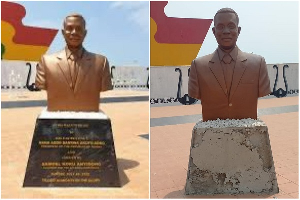Africa must negotiate a common framework in harnessing its critical mineral resources under the African Continental Free Trade Area (AfCFTA) to accelerate the development of the continent.
The Director of the United Nations University Institute for Natural Resources in Africa (UNU-INRA), Dr Fatima Denton, who made the call, said the continent needed to seize the opportunity provided by energy transition to spur development as failure could spell doom for the cohesion of the continent and deepen poverty.
To make mining the basis for economic development, she said Africa must have a common agenda for the extraction of its critical mineral resources.
The mineral resources include lithium, cobalt, copper, manganese, which are critical for the world’s energy transformation.
Speaking at a three-day international conference on Energy Transition, Africa’s Extractive Resources and the Future of Africa’s Development, Dr Denton expressed fears the history of the continent’s energy poverty would likely not change and stressed the need for Africa to lead the discourse on Energy Transition.
She said Africa must move from the dependency syndrome of export of raw materials to value addition.
The three-day programme being organised by the Third World Network-Africa (TWNAfrica) and the Southern Africa Resource Watch is on the theme “Energy Transition, Africa’s Extractive Resources, and the Future o Africa’s Development.”
Sponsored by the Dutch Ministry of Foreign Affairs, the programme attracted more than 35 participants across the world from academia, development organisations and civil society.
Dr Denton stressed the need for Africa to diversify its economy from mineral and fossil, to tourism, agriculture, and services to create jobs for the teeming youth, given the transition from fossil to green and cleaner sources of energy.
“Africa is in a pole position to lead in the green transition and to reduce energy poverty,” she stated.
Dr Denton observed that Africa had huge green market and opportunity to invest in green energy, saying the AfCFTA was an opportunity for Africa to trade in green energy.
She stressed that Africa said must showcased its critical minerals and relied on them to develop and transition to cleaner sources of energy.
That, Dr Denton could be achieved through changing the power relations between Africa and the the developed economies.
The Coordinator of TWNAfrica, Dr Yao Graham, said Africa must have a clear strategy and a collective approach in the extraction of its critical minerals.
He said Latin American countries had set clear agenda strategy on its critical minerals and Chile recently nationalised its critical mineral wealth.
“Critical minerals of properly used can help Africa transitioned to cleaner sources of energy and provide energy for the structural transformation and industrialisation of Africa,” he stated.
Dr Graham said not transitioning to cleaner energy sources to reduce climate change was not an option to Africa, and what was important was to use the Africa’s mineral wealth for the energy transition process.
He said the objective of conference was to bring expert together to discuss and come out with an African narrative on Energy Transition.
The Coordinator of TWN Africa said the meeting was also to discuss some key issues to inform policy on Energy Transition.
“The meeting is to help build an African Constituency for the African agenda on mineral value addition and Energy Transition, Dr Graham said.
Claude Kabemba of the Southern Africa Resource Watch said in the face of current structural economic difficulties, it would be very difficult to take advantage of the opportunities presented by energy transition.
He said there was also the need to resolve the issue of information asymmetry to enhance understanding of transitional minerals.
Business News of Tuesday, 30 May 2023
Source: GNA

















